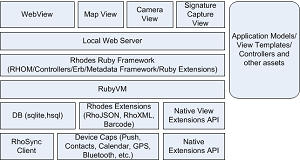News
RhoMobile App Development Suite Embraces IoT
- By David Ramel
- June 25, 2015
With a recent survey indicating half of developers aren't ready to build successful Internet of Things (IoT) projects, the RhoMobile mobile app development platform has been updated with specific IoT functionality built in.
Zebra Technologies Corp. today announced the cross-platform RhoMobile 5.1, with key updates for developers. The suite lets developers use Web technologies such as HTML5, JavaScript, CSS and Ruby, to build native (or near-native, depending on how technical you want to get) apps for multiple targets including iOS, Android and Windows.
"Core to the launch of RhoMobile 5.1 is a focus on supporting more industrial and consumer-facing mobile devices, an expanded set of common application programming interfaces (APIs) to expedite multi-platform app development, and instant live updates onto a device or simulator for immediate app testing," the company said in a news release.
Company product manager Alison Clark said the suite lets developers connect to any IoT sensors, devices, systems and so on that expose APIs to the Internet.
In an interview with ADT Mag, Clark related several use cases where customers were doing just that, including one who was tracking the temperature of food products as they moved through the delivery pipeline from the packing plant to the end destination so food safety inspectors can confirm it was shipped safely.
From monitoring utility pipelines to hospital devices, Clark said the RhoMobile suite "opens the door to possible solutions for companies, and what they can do."
 [Click on image for larger view.]
Framework Architecture (source: Zebra Technologies Corp.)
[Click on image for larger view.]
Framework Architecture (source: Zebra Technologies Corp.)
The RhoMobile suite consists of several components, including RhoElements, RhoStudio, RhoConnect and RhoGallery.
RhoElements is an API framework focused on enterprise development. It features a Model-View-Controller design pattern, a built-in object relational mapping (ORM) tool for data-intensive coding, integrated data synchronization and what the company calls "the broadest API set of any framework."
RhoStudio is a plug-in for the popular Eclipse IDE, obviating the need to download separate SDKs.
RhoConnect is a server application that lets developers integrate data into their apps for offline access and synchronize it with the back-end when connectivity is available. Such online/offline capability with automatic synchronization is a growing trend in the development of modern mobile apps.
That capability fits in well with the company's approach to building cross-platform native apps, Clark said.
"With RhoMobile, when you build your application, it's actually compiling down and compiling bits that get installed on the device," Clark said. "So we compile down to iOS bits or compile down to Android bits, or Windows Mobile etc. That allows us to have the capability to have the logic and data on the device, so if you're in an enterprise and you're in an area that doesn't have connectivity, the users of that application can still perform their work. And when they're connected again, the data synchronization occurs, so that's where it becomes really key to have that data synchronization component as part of it."
The final component, RhoGallery, helps distribute the apps to users following the app store model, with an enterprise twist.
Clark also emphasized the enterprise-oriented functionality of RhoMobile, including its embrace of the Windows ecosystem, including Windows Embedded Handheld, Windows CE and Windows Phone 8. While some of those technologies may be older and nearing end of life in four years or so, they are still heavily entrenched in many organizations. Clark said being able to update apps for those platforms is important, along with the ability to develop for newer targets.
"Having that cross-platform capability to build applications that not only can go on the different OSes, but was really designed to be data intensive -- to have those synchronization capabilities work online and offline -- that really targets it more toward the capabilities of what the enterprise needs," Clark said.
Like some other similar tools, the RhoMobile application container provides API libraries to access device-level capabilities -- including GPS, camera and so on -- via JavaScript and Ruby interfaces. The Ruby functionality sets RhoMobile apart from those other tools, however. RhoMobile is based on the open source Rhodes API library project, a framework originally written in Ruby. As the project changed commercial hands, the more commonly used JavaScript API approach was incorporated, with the Ruby option remaining.
"With this launch, we've added support for new devices critical to use in industrial and retail scenarios," exec Mark Kirstein said in a statement. "The addition of new common APIs means that developers looking to leverage functionality on a specific mobile platform no longer need to consider which API is used for which, because we've added a single, all-capable option. With live updates, developers who previously may have waited 15 minutes each time code was updated to a device for testing can now push those changes automatically and see the impact of those code changes immediately."
RhoMobile Suite pricing schemes range from free for an offering including RhoStudio and Rhodes (local build), to $299 per month for the Silver plan with more capabilities to the Gold plan for $999 per month.
About the Author
David Ramel is an editor and writer at Converge 360.